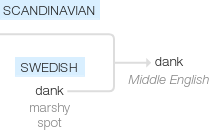Dank
Middle English: probably of Scandinavian origin and related to Swedish dank ‘marshy spot’.
wiktionary
From Middle English danke(“wet, damp; dampness, moisture”), probably from North Germanic, related to Swedish dank(“marshy spot”), Icelandic dökk(“pool”), Old Norse dǫkk(“pit, depression”), from Proto-Germanic *dankwaz(“dark”). However, some trace it to a West Germanic source such as Dutch damp(“vapor”) or Middle High German damph, both ultimately from Proto-Germanic *dampaz(“smoke, steam, vapor”) [1] [2] [3].
From Middle English danken, from the adjective (see above).
dank (plural danks)
etymonline
dank (adj.)
"saturated with cold moisture," c. 1400, earlier as a verb (early 14c.), now obsolete, meaning "to moisten," used of mists, dews, etc. Perhaps from Scandinavian (compare Swedish dank "moist place," dänka "to moisten") or German (compare Middle High German damph, Dutch damp "vapor"). Now largely superseded by damp (adj.). As a noun, "cold moisture," c. 1400. Related: Dankly; dankness.
